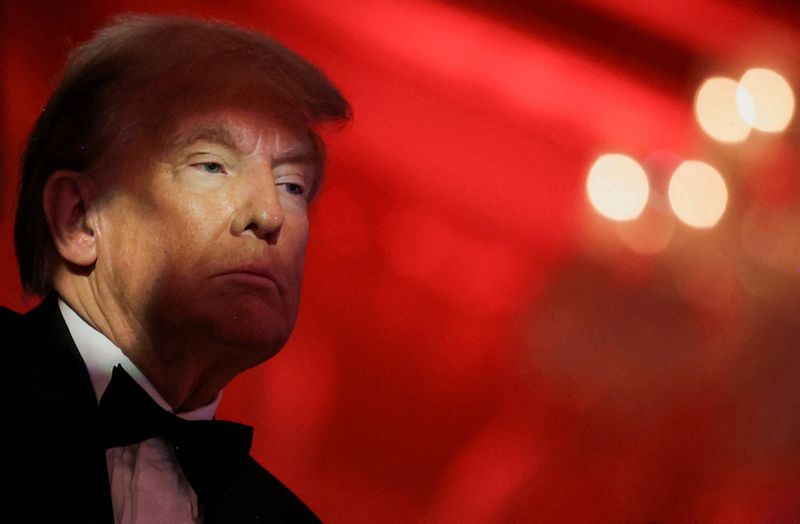By Niket Nishant, Shivansh Tiwary and Manya Saini
(Reuters) - Corporate executives were taking a wait-and-see approach to President-elect Donald Trump's vow to impose heavy tariffs on imports when he takes office in January, but many have raised concerns about the effect such levies will have on inflation.
Numerous major U.S. corporations addressed tariffs at recent investor events and on conference calls, including some after the Nov. 5 election, when Trump edged out sitting Vice President Kamala Harris.
Walmart (NYSE:WMT), the nation's largest retailer, suggested on Tuesday after reporting results that prices could increase if tariffs rise.
"We're concerned that significantly increased tariffs could lead to increased costs for our customers at a time when they are still feeling the remnants of inflation," a Walmart spokesperson said.
Trump has vowed to make tariffs, which are a fraction of U.S. tax collections, central to his economic agenda. Executives have been increasingly fielding questions on the subject, with many noting ongoing efforts to continue to diversify their supply chains, particularly away from China, Trump's top target.
Since the beginning of September, executives from nearly 200 companies in the S&P 1500 Composite index discussed tariffs on earnings calls or at investor conferences, nearly doubling the same period in the run-up to the 2020 election, and far more than the 23 mentions in 2023, according to LSEG data.
"Roughly 40% of our cost of goods sold are sourced outside of the U.S., and that includes both direct imports and national brands through our vendor partners," Lowe's CFO Brandon Sink said on Tuesday. "And as we look at the potential impacts (of tariffs), it certainly would add to product costs."
Trump has floated the idea of 60% tariffs on China, the world's largest exporter, and universal tariffs of 10% or more, which he says is necessary to eliminate the U.S. trade deficit.
Oxford Economics estimated a 60% China tariff could boost U.S. inflation by 0.7 percentage points, and across-the-board tariffs would boost inflation by 0.3 points. Oxford believes any tariffs would be gradually introduced, but some analysts are worried about a shock effect.
"Trump 47 won't be a mere replay of Trump 45," said Brian Jacobsen, chief economist at Annex Wealth Management, noting that the president-elect's proposals now were "far more expansive."
POSSIBLE SECTOR EFFECTS
The sectors that account for the most imports to the United States include electronic products, transportation equipment, chemicals and minerals, according to the U.S. International Trade Commission.
Taiwan, a key partner for the crucial U.S. semiconductor industry, was a target of Trump's rhetoric in the run-up to the election. He suggested that Taiwan should pay for U.S. protection against the threat of China - which claims the island as its own territory - and accused it of poaching the semiconductor industry.
Any retaliation may affect U.S. tech giants like Apple (NASDAQ:AAPL), Nvidia and Qualcomm (NASDAQ:QCOM), which count Taiwan as a vital component of their supply chain.
Tariffs could raise prices on clothing, toys, furniture, appliances, footwear, and travel goods, particularly items where China is a major supplier, according to the National Retail (NYSE:NNN) Federation, a U.S. trade group of which Walmart's U.S. head is the chair.
"It is certainly one of the quickest things that could happen, because it could kind of happen with the stroke of a pen," Stanley Black & Decker (NYSE:SWK) CFO Patrick Hallinan said at a Robert W. Baird investor conference last week. He said current tariffs are costing it about $100 million a year, which could double under Trump's proposals.
To be sure, companies started to shift production away from China during Trump's first term, and continued to do so following legislation passed during Joe Biden's term designed to boost U.S. manufacturing.
U.S. goods imports from China peaked at $538.5 billion in 2018, according to U.S. Census Bureau data, and were $433.3 billion over the 12 months ended in September.

Businesses may also be better prepared to deal with shifts following the COVID-19 pandemic, numerous labor strikes and disruptions to key waterways like the Panama and Suez canals, executives said.
"We've had so many disruptions and challenges that have forced us to make adaptions. We're pretty well versed in managing through this," Tapestry CFO Scott Roe said.